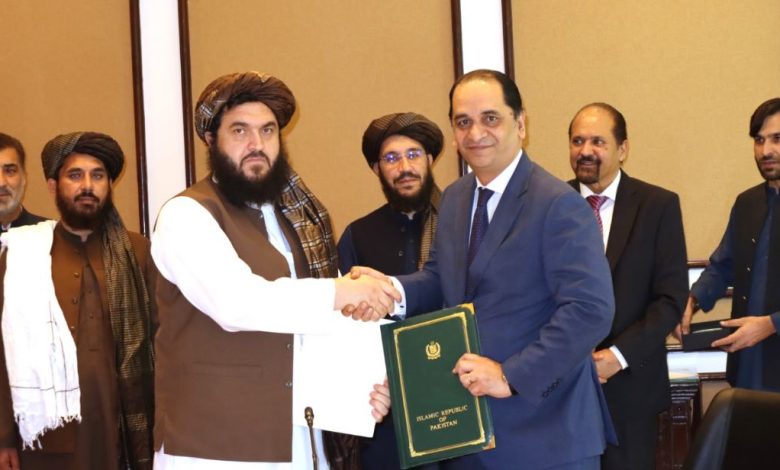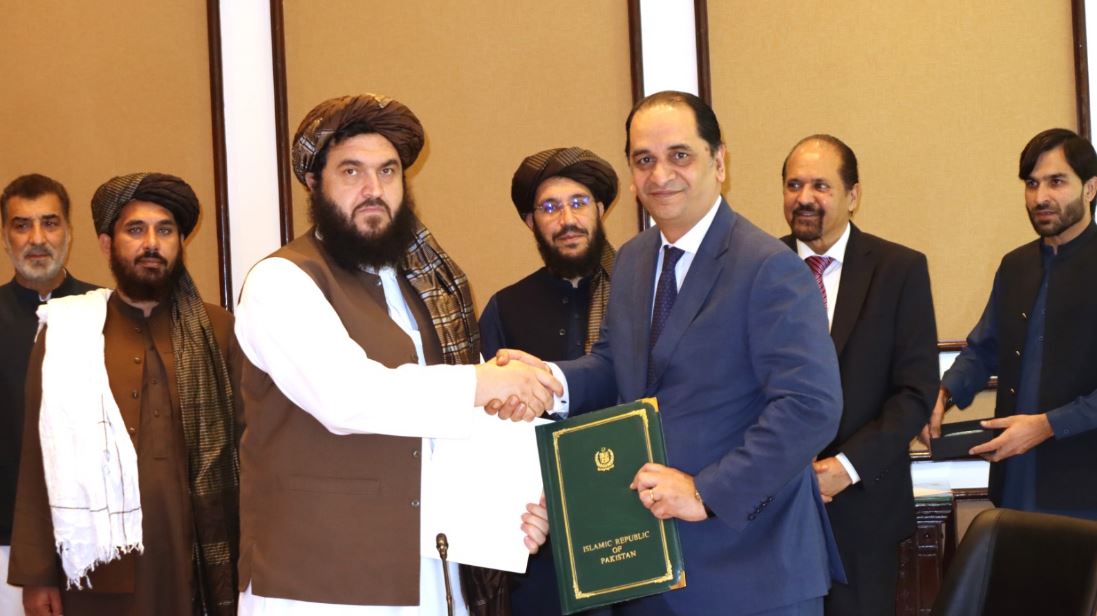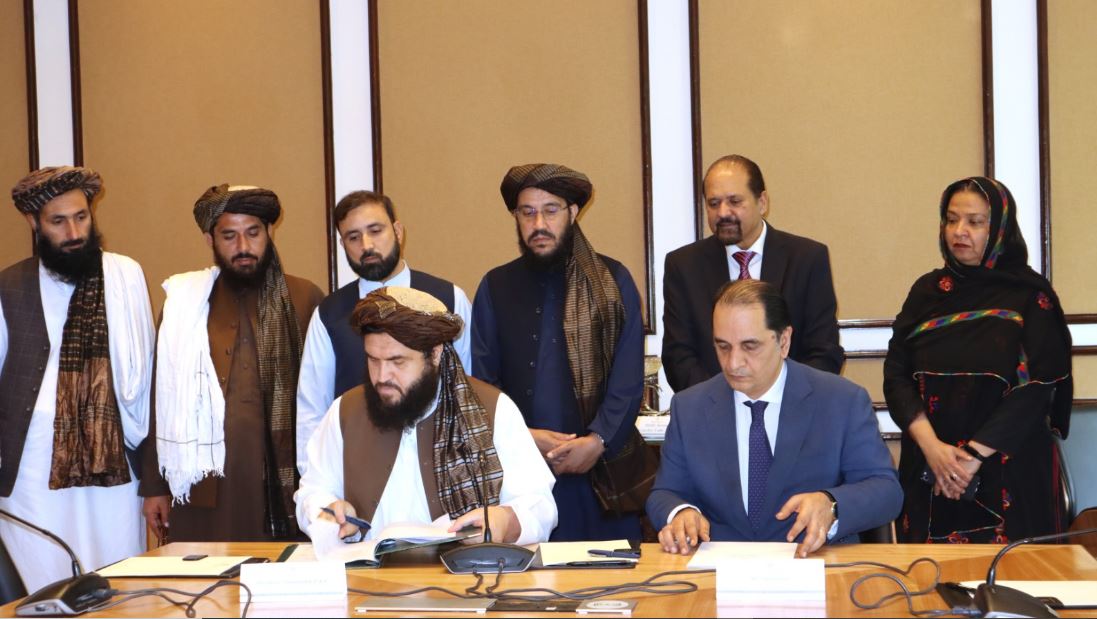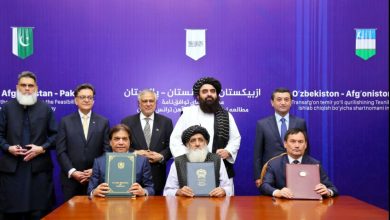Pakistan, Afghanistan Sign Preferential Trade Agreement to Reduce Tariff Rate
Preferential Trade Agreement was signed between the Ministry of Industry and Commerce of Afghanistan and Ministry of Commerce of the Islamic Republic of Pakistan

-
Afghanistan Ministry of Industry and Commerce and Ministry of Commerce of the Islamic Republic of Pakistan signed the Preferential Trade Agreement
-
Preferential Trade Agreement (PTA) symbolizes Progress of Pakistan and Afghan trade ties
By: Muhammad Arif, Editor NSN.Asia
Islamabad: The Ministry of Industry and Commerce of Afghanistan and Ministry of Commerce of the Islamic Republic of Pakistan have formally signed the Preferential Trade Agreement (PTA) aims to reduce tariff rates on exports, leading to enhance bilateral trade.
The Preferential Trade Agreement (PTA) was formally signed by H.E. Deputy Minister Mullah Ahmadullah Zahid, and represented by H.E. Deputy Minister Javed Paul.

Under the provisions of this agreement, the tariff rates on four Afghan export items to Pakistan — grapes, pomegranates, apples, and tomatoes — as well as four Pakistani export items to Afghanistan — mangoes, kinnows), bananas, and potatoes — which previously exceeded 60%, will now be reduced to 27%.
This agreement will be effective for a period of one year, commencing on August 1, 2025. It is renewable and also allows for the inclusion of additional items in the future.

- Trade between Pakistan and Afghanistan
Trade between Pakistan and Afghanistan saw a robust upswing in 2024, reflecting improved regional connectivity and growing demand for Pakistani goods in Afghan markets.
The total Bilateral Trade: $1.998 billion — a 25% increase from $1.603 billion in 2023 wherein Pakistan’s exports to Afghanistan: $1.391 billion — up 31% year-on-year and Afghanistan’s Exports to Pakistan were around $607 million — up 13%
As regards major products of Pakistani Exports, Sugar was top on the list and it urged by 4,333%, from $5.93 million to $262.77 million. Also, cereals, pharmaceuticals, construction materials, and textiles also performed strongly
Exports of rice, eggs, salts, electrical equipment, and footwear saw year-on-year saw a declining trend, ranging from 17% to 99%.
In June 2025, Pakistan’s exports rose 90% year-on-year to $142 million and imports from Afghanistan in June dropped 29% YoY and 54% compared to May.
According to experts, PTA could to lead to enhanced trade facilitation, and foster stronger regional connectivity besides creating a rising demand for Pakistani goods in Afghanistan.
- Trade Challenges between Pakistan and Afghanistan
Despite growing trade volumes, several persistent challenges continue to hinder the full potential of economic exchange between Pakistan and Afghanistan, the south neighbours.
Border closures and security concerns seem major barriers to bilateral trade. For instance, frequent shutdowns at key crossings like Torkham and Chaman disrupt supply chains and spoil perishable goods
Also, cross-border skirmishes and disputes over the border exacerbate tensions.
Poor road infrastructure and rugged terrain limit efficient cargo movement and underdeveloped border facilities and lack of cold storage impact agricultural exports too.
Afghan traders increasingly pivot to Iranian trade routes, reducing Pakistan’s market share by nearly 80% over two years.
These security, transport and legal barriers not only affect bilateral trade but also undermine regional integration efforts.
- Progressing Pakistan and Afghan relationship
Despite challenges, Pakistan and Afghan relationship has seen diplomatic reboot in 2025 including high-level visits. In April 2025, Pakistan’s Deputy PM Ishaq Dar visited Kabul—the first major trip since early 2023. Dar met Afghan Foreign Minister Amir Khan Muttaqi to discuss security, trade, transit, and refugee issues.
Prior to Dar’s visit, senior military and intelligence officials from both sides met in Kabul, signaling a quiet push to re-engage.
In bilateral talks and discussions with Afghan officials, Pakistan emphasized security and border management, urging Kabul to act against the TTP while Afghanistan envoys highlighted trade, refugee rights, and economic cooperation, downplaying security concerns.
- Connectivity is Road to Peace and Prosperity
The road to peace, prosperity in Afghanistan lies in mending bilateral and regional ties.

The Preferential Trade Agreement (PTA) is sign of progress towards peace and development if both sides keep communication channels open and explore joint projects to improve regional connectivity through CPEC, ML1, and Trans Afghan Railway.





